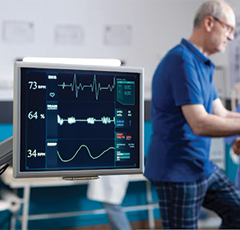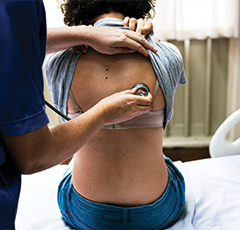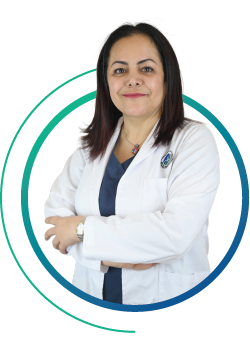Overview
A rehabilitation center is a specialized facility that provides comprehensive care and therapies to help individuals recover from physical injuries, surgeries, or medical conditions. These centers focus on improving patients’ functional abilities, mobility, and overall quality of life through personalized treatment plans and multidisciplinary approaches.
TREATMENTS & PROCEDURE

Individualized exercises and therapies to improve strength, flexibility, and mobility.
Physical therapists design personalized treatment plans to address musculoskeletal injuries, neurological disorders, and post-surgical rehabilitation. Techniques may include manual therapy, therapeutic exercises, and modalities like ultrasound and electrical stimulation.

Activities and interventions to improve independence in daily activities.
Occupational therapists focus on enhancing skills needed for daily living, work, and leisure activities. They address physical, cognitive, and psychosocial aspects to promote independence and quality of life.

Techniques to address speech, language, and swallowing disorders.
Speech-language pathologists work with patients to improve communication skills, speech clarity, language comprehension, and swallowing function. Therapy may involve exercises, augmentative communication devices, and modified diets.

Exercise and education programs for patients recovering from heart conditions or surgeries.
Cardiac rehabilitation programs focus on improving cardiovascular health through supervised exercise, heart-healthy lifestyle education, and emotional support. They help manage heart disease risk factors and optimize recovery post-cardiac event or surgery.

Multidisciplinary approaches to alleviate chronic pain and improve function.
Pain management programs integrate medical, physical, and psychological therapies to reduce pain intensity and improve quality of life. Treatments may include medications, injections, physical therapy, and behavioral interventions.
Individualized exercises and therapies to improve strength, flexibility, and mobility.

Physical therapists design personalized treatment plans to address musculoskeletal injuries, neurological disorders, and post-surgical rehabilitation. Techniques may include manual therapy, therapeutic exercises, and modalities like ultrasound and electrical stimulation.
Activities and interventions to improve independence in daily activities.

Occupational therapists focus on enhancing skills needed for daily living, work, and leisure activities. They address physical, cognitive, and psychosocial aspects to promote independence and quality of life.
Techniques to address speech, language, and swallowing disorders.

Speech-language pathologists work with patients to improve communication skills, speech clarity, language comprehension, and swallowing function. Therapy may involve exercises, augmentative communication devices, and modified diets.
Exercise and education programs for patients recovering from heart conditions or surgeries.

Cardiac rehabilitation programs focus on improving cardiovascular health through supervised exercise, heart-healthy lifestyle education, and emotional support. They help manage heart disease risk factors and optimize recovery post-cardiac event or surgery.
Multidisciplinary approaches to alleviate chronic pain and improve function.

Pain management programs integrate medical, physical, and psychological therapies to reduce pain intensity and improve quality of life. Treatments may include medications, injections, physical therapy, and behavioral interventions.
Diseases treated
FAQs
A rehabilitation center provides specialized care and therapies to help individuals recover from injuries, surgeries, or medical conditions, focusing on improving functional abilities and quality of life.
Physical therapy improves mobility, strength, and flexibility through exercises and treatments designed to restore function after injury or surgery.
Cardiac rehabilitation programs support recovery from heart conditions or surgeries, focusing on cardiovascular conditioning, lifestyle changes, and heart-healthy behaviors.
Pain management programs use multidisciplinary approaches to reduce pain intensity and improve function, combining medical, physical, and psychological therapies.
Therapies include physical therapy, occupational therapy, speech therapy, cardiac rehabilitation, and pain management programs tailored to individual needs.
Occupational therapy helps individuals regain skills needed for daily activities, work, and leisure, addressing physical, cognitive, and emotional challenges.
Speech therapy addresses speech, language, and swallowing disorders, helping individuals improve communication skills and manage swallowing difficulties.
Yes, rehabilitation centers offer pediatric therapies to address developmental delays, injuries, and conditions affecting children’s mobility and function.
Rehabilitation Center Doctors













